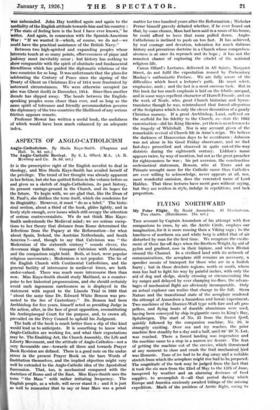ASPECTS OF ANGLO-CATHOLICISM
The Anglo-Catholic Revival. By S. L. 011ard, MA. (A. R. Mowbray and Co. 3s. 6d. net.)
IT is the prescriptive right of the English novelist to deal in theology, and Miss Sheila Kaye-Smith has availed herself of the privilege. The trend of her thought was already apparent in her fiction, but she-has quitted fiction in the volume before us
and gives us a sketch of Anglo-Catholicism, its past history, its present vantage-ground in the Church, and its hopes for the future. To begin with, we are glad that, like the Dean of St. Paul's, she dislikes the term itself, which she condemns for its illogiCality. However, it must " do as a label." The histO-; real section, about a third of the book, glides lightly, and in lively style enough, over issues which still occupy the attention of serious controversialists. We do not think Miss [(aye-
Smith understands the Medieval mind ; we see serious excep- tions to her, theory that distance from Rome determined the defections from the Papacy at the Reformation—for what about Spain, Ireland, the Austrian Netherlands, and South
America ?—and, though to say that Calvinism was "the Modernism of the sixteenth century" sounds clever, the cleverness iings hollow. Compare Calvinism with Arianism, and the comparison might hold. Both, at least, were popular religious movements ; Modernism is not popular. The tie of the English Church with Continental Catholicism, and the general facility of intercourse in medieval times, are both under-valued. There was much more intercourse then than now. Miss Kaye-Smith should study Maitland, as a counter- poise to her historical prepossessions, and she should certainly avoid such ingenuous carelessness as is displayed in the statement with regard to the Lincoln Trial in 1888 that "about the same time Dr. Edward White Benson was pro- moted to the See of Canterbury." Dr. Benson had been Archbishop for five years, himself acted as presiding Judge in the action, after, in the face of great opposition, reconstituting his Archiepiscopal Court for the purpose, and, to crown all, prevailed on the Privy Council to uphold his Judgment.
The bulk of the book is much better than a slip of this kind would lead rus to anticipate. It is something to know what lAnglo-Catholics are working for, and what their expectations may be. The Enabling Act, the Church Assembly, the Life and ;Liberty Movement, and the attitude of Anglo-Catholics—not a very favourable one—towards all three and towards Prayer
Book Revision are defined. There is a good note on the undue ;stress in the present Prayer Book on the bare Words of -Institution themselves, and the implied objection might very well be extended to the Anglo-Catholic idea of the Apostolieal Succession. That, too, is mechanical compared with the doctrines of Rome and of the East. Miss Kaye-Smith uses the term "the Mass" with rather irritating frequency. The English people, as a whole, will never stand it ; and it is just as well to remember that to say or hear Mass was a penal
matter for two hundred years after the Reformation ; Nicholas Ferrar himself gravely debated whether, if he ever found out that, by some chance, Mass had been said in a room of his house, he could afford to have that room pulled down. Anglo- Catholicism is inclined to push on too: fast. It has achieved, by real courage and devotion, toleration for much dubious history and precarious doctrine in a Church whose comprehen- siveness is at once its reproach and its hope ; it has not the remotest chance of capturing the citadel of the national religious life.
Canon 011ard's Lectures, delivered in All Saints, Margaret Street, do not fulfil the expectation roused by Prebendary Mackay's enthusiastic Preface. _ We are fully aware of the difficulties which beset a lecturer's path. He must select, emphasize, omit ; and the last is a most onerous task. But in this book far too much emphasis is laid on the febrile, unequal, and in some ways -repellent character of Hurrell Froude, and on the work of Neale, who, great Church historian and hymn-. translator though he was, reintroduced that forced allegorism of the Scriptures which is only the clever decoration of a gaudy Christian nursery. If a great Archbishop, Laud, suffered on the scaffold for his fidelity to the Church, so—tests the 1662 canonization—did his King likewise, yet there is no reference to the tragedy of Whitehall. Nor is any account given of the remarkable revival of Church life in Anne's reign. We believe the darkness of Hanoverian days to be overdrawn : Johnson was not alone in his Good Friday observance, and we find fast-days prescribed and observed in quite out-of-the-way districts during the eighteenth century. Liddon's name appears twice, by way of mention, but not as the great preacher for righteousness he was ; his pet aversion, the constructive ecclesiastical statesman, Benson, who at Truro and as Primate wrought more for the Catholic cause than Catholics are ever willing to acknowledge, never appears at all, nor, most wonderful omission, does the venerated name of Lord Halifax. That these lectures have merit goes without saying, lint they are restless in style, indulge in repetitions, and lack proportion.










































 Previous page
Previous page